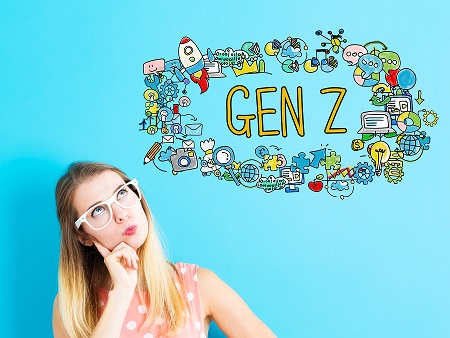 By 2022, two out of five new moms will be part of Generation Z. This is the generation born between 1997 and 1999 that grew up with Facebook and social media, tablets and smart phones. This is the generation for whom, “technology is like oxygen” says Julie Michaelson, head of Global Sales for BabyCenter.
By 2022, two out of five new moms will be part of Generation Z. This is the generation born between 1997 and 1999 that grew up with Facebook and social media, tablets and smart phones. This is the generation for whom, “technology is like oxygen” says Julie Michaelson, head of Global Sales for BabyCenter.
Though mainly conducted for marketing purposes, it’s interesting to note that according to a new study by the Collage Group and the popular mommy blog, BabyCenter, young Generation Z moms are bigger worriers compared to their Millenial predecessors as well as their Generation X parents.
Titled, Futurecasting Families: Early Insights into Generation Z & the Future of Parenting, researchers of the study believe part of the reason why the latest generation is more anxious than previous generations, especially women and moms, is because Generation Z grew up during the recession of the early 2000s and during the 9/11 Twin Tower attacks in New York when the world was at a heightened state of anxiety. Researchers say that Generation Z’s parents, Generation X, instilled a “worry-filled mindset” in their children.
“Gen Z females, no matter age and parenthood status, are more apt to admit to being more anxious than most people (Gen Z girls: 57 percent; Gen Z women: 58 percent; Gen Z moms: 56 percent),” notes the study press release. These results showed a remarkable and direct contrast with the typical emotional state of mothers self described as Millennials. The authors showed that only 44 percent of the generation Z women reported that they had similar experiences with anxiety.
Study results were obtained from responses to survey questions by 204 Generation Z moms and 1,752 Millenial moms on the BabyCenter website between November 13th and November 29th, 2017 along with other data from the Collage Group. Researchers identified six key takeaways of the study, higher rates of anxiety being one of them. The other five included how Generation Z is proving to be more traditionalist than generations, placing more emphasis on traditional values such as marriage. More than six in ten Generation Z females pictured themselves getting married.
Another key takeaway was the importance of social media in the life of a Generation “Z-er”. More than 70% of Generation Z females say they regularly experience “FOMO”, which is short for the “Fear of Missing Out”, in which should they fail to constantly check their social media channels, they might miss out on the latest gossip or news which everyone seemingly is talking about. Generation Z moms on the other hand, don’t quite experience FOMO. Only 36% of Generation Z moms experience the fear of missing out – probably because they’re too busy being extremely young moms.
Another key takeaway is the high value Generation Z females place on spontaneity and how they love to use social media to share their spontaneous adventures with others. The study also revealed that Generation Z moms don’t tend to trust reviews online but are open to digital advertising.
Other research corroborates the Baby Center study citing Generation Z-ers as worriers. In other studies, Generation Z is also known as the iGeneration, Gen Tech, Gen Wii, Net Gen, Digital Natives, Plurals, Post Millenials, and the Homeland Generation. The “Homeland Generation” name came after 9/11, after the results of an online contest which believed Americans would favor remaining in their home country rather than travelling abroad, for safety reasons.
There are more Generation Z-ers than Baby Boomers as they make up 25% of the U.S. population and they are the least likely generation to believe in “the American dream”. Other studies also show that nearly 50% of Generation Z-ers in the U.S. are worried about student debt and 36% are worried they won't be able to afford any kind of post secondary education.
But it’s not all bad news. According to the former director of data at Advertising Age, Matt Carmichael, the generation following Generation Z will be "the most formally educated generation ever, the most technology supplied generation ever, and globally the wealthiest generation ever".
As for what the next generation will be called? Carmichael is going with Generation Alpha.
REFERENCES:
Business Wire, (March 5, 2018), BabyCenter and Collage Group Release Results of New Study "Futurecasting Families: Early Insights into Generation Z & the Future of Parenting", https://www.businesswire.com/news/home/20180305005394/en/BabyCenter%C2%AE-Collage-Group-Release-Results-New-Study
Bromwich, Jonah, (31 Jan 2018), "We Asked Generation Z to Pick a Name. It Wasn't Generation Z". The New York Times, https://www.nytimes.com/2018/01/31/style/generation-z-name.html
Howe, Neil, Strauss, William, (2008), Millennials & K-12 Schools. LifeCourse Associates, pp. 109–111. ISBN 0-9712606-5-6
Williams, Alex, (19 September 2015), "Meet Alpha: The Next 'Next Generation'", New York Times, https://www.nytimes.com/2015/09/19/fashion/meet-alpha-the-next-next-generation.html
Patricia Tomasi is a mom, maternal mental health advocate, journalist, and speaker. She writes regularly for the Huffington Post Canada, focusing primarily on maternal mental health after suffering from severe postpartum anxiety twice. You can find her Huffington Post biography here. Patricia is also a Patient Expert Advisor for the North American-based, Maternal Mental Health Research Collective and is the founder of the online peer support group - Facebook Postpartum Depression & Anxiety Support Group - with over 1500 members worldwide. Blog: www.patriciatomasiblog.wordpress.com
Email: tomasi.patricia@gmail.com